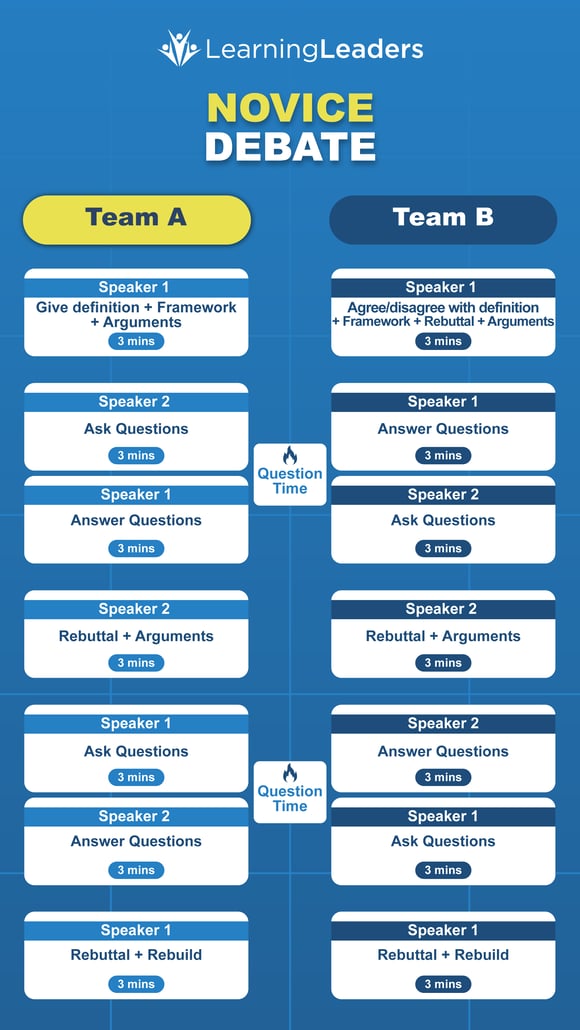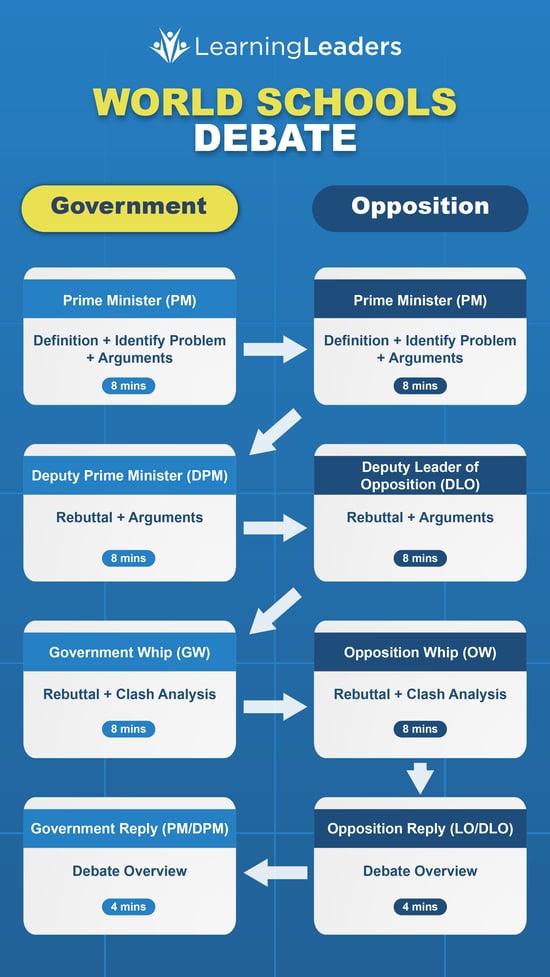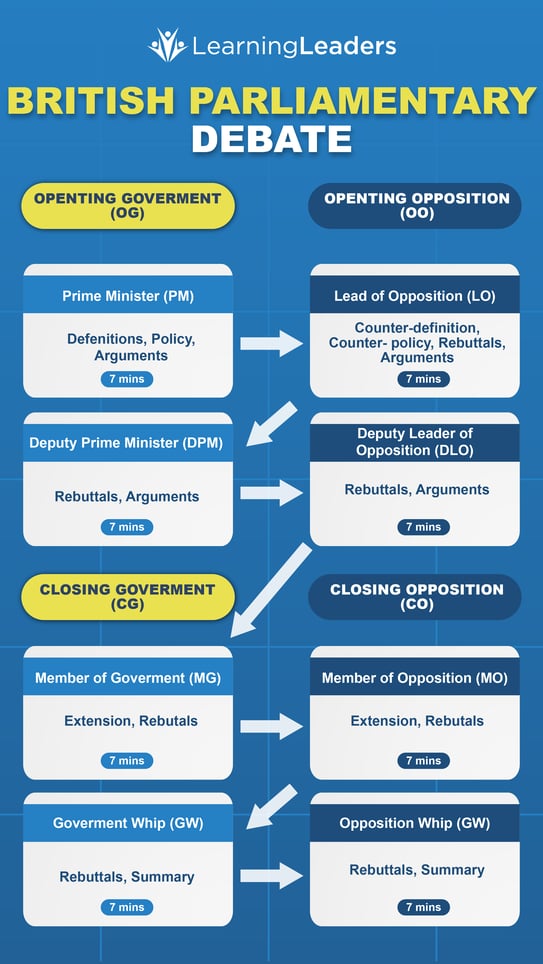Introduction to Public Speaking and Debate (Part III)

Popular Public Speaking and Debate Formats
We hope you enjoyed Part I & II of this blog series! If you haven't got a chance to read it yet you can do so here:
Introduction to Public Speaking and Debate (Part I).
Introduction to Public Speaking and Debate (Part II).
In this series of articles, you will be able to learn about:
- Steps on how to help students build a habit of practicing at home
- Topics that can help students practice
- How to understand and track a student's progression
Different public speaking and debate formats use different rules and criteria. Identifying different public speaking and debate formats enables students to choose the most suitable or interesting formats for them. Here are the most popular formats worldwide:
Storytelling
Definition: Storytelling is used in a lot of junior public speaking circumstances. Storytelling encourages students to speak out their experience, or imagine a new story, or tell other's stories. The aim is to raise empathy, teach a lesson or to entertain.
Rules: Different competitions have different rules for storytelling division.
Skills: Delivery skills (including eye contact, body language, vocal variation), speech structure, language usage (for example, descriptive language).
Benefits: Storytelling skills are used in wild circumstances, from telling a friend about a sad experience, to promote a product in workplaces. Storytelling has the magic to make people feel what the speaker is feeling, to think from other perspectives and other possibilities, to make people interested in listening to more and achieve the speaker's goal.
Example speech: https://www.ted.com/talks/steve_jobs_how_to_live_before_you_die
Relevant LearningLeaders course(s): Novice Public Speaking
Persuasive Speaking
Definition: Persuasive Speaking seeks to persuade the audience into believing a new concept, changing their minds, or encourage them to conduct certain actions.
Rules: Different competitions have different rules for persuasive speaking division.
Skills: Delivery skills (including eye contact, body language, vocal variation), speech structure, research and citation, argumentation and analysis.
Benefits: Learn how to speak persuasively allows students to horn their skills to get more buy-ins from other people. When they want to be elected as a class monitor, when they want to convince the school to fund for their projects, when they want to promote a product during vacation internship, it can help them to get more support from other. At the same time, a lot of school assignments require students to have an opinion and to prove their opinions, students who have learned persuasion skills tend to do better and have more broad ideas in those assignments.
Relevant LearningLeaders course(s): Intermediate Public Speaking
Example Speech:https://www.ted.com/talks/jennifer_zhu_scott_why_you_should_get_paid_for_your_data/transcript
Impromptu Speech
Definition: An Impromptu speech is where competitors receive a prompt and deliver a speech related to the prompt given.
Rules: Speakers will receive a prompt and are required to prepare AND deliver a speech within 7 minutes. The speech must be original.
Skills: Delivery skills (including eye contact, body language, vocal variation), speech structure, analysis, argumentation.
Benefits: Impromptu speaking practice students' ability to analyze quickly in a short time, it also helps students to be more assertive and confident presenting in front of other people. In order to horn their skills in impromptu speaking, students will have to read news and understand current issues, research for more knowledge they have not had a clue for!
Example speech: https://www.youtube.com/watch?v=Wrb6c5gyRIw
Relevant LearningLeaders course(s): Advanced Public Speaking
Extemporaneous Speech
Definition: Extemporaneous speech asks a question about current events and requires speakers to answer with incorporated research and evidence into their speech after limited preparation time.
Rules: Competitors have 30 minutes to prepare for a speech ranging from 5 to 7 minutes. Competitors are allowed to research during prep time. The speech must be original.
Skills: Delivery skills (including eye contact, body language, vocal variation), speech structure, argumentation, research and citation, analysis.
Benefits: Extemporaneous speaking helps students to pay more attention to current issues and think critically about recent events. Through their practice, students will horn their research skills and analysis skills, which will be used effectively in school assignments.
Example speech: https://www.youtube.com/watch?v=cgkTm-_Igdg
Relevant LearningLeaders course(s): Distinguished Public Speaking
Novice Debate
Definition: Novice debate is a LL-originated format for students who are building a foundation for debate. There are four participants in a novice debate, with two people in the PRO side supporting the topic and another two on the CON disagree with the topic.
Rules:

Benefits: Learn how to speak persuasively and how to respond to disagreements allows students to horn their skills to get more buy-ins from other people. When they want to be elected as a class monitor, when they want to convince the school to fund for their projects, when they want to promote a product during vacation internship, it can help them to get more support from other. At the same time, a lot of school assignments require students to have an opinion and to prove their opinions, students who have learned persuasion skills tend to do better and have more broad ideas in those assignments.
Skills: Delivery skills (including vocal variation, hand gesture), speech structure, argumentation & refutation, analysis, teamwork.
Relevant LearningLeaders course(s): Novice Debate
World Schools Debate
Definition: World Schools Debate is a combination of the British Parliamentary and Australia-Asian debating formats. In the World Schools debate, there are two teams – Proposition and Opposition. Each team is composed of 3-5 people, while only 3 of them will have the chance to speak. Debaters will be given a topic and have limited time (30 to 60 minutes, varies from competition to competition. Some competitions have some prepared topics, students will receive those topics one month before the competition and they will not have time to prepare for those topics) to prepare as a team. The topic will be different for each round.
Rules:

Skills: Delivery skills (including vocal variation, hand gesture), speech structure, argumentation & refutation, analysis, teamwork.
Benefits: Learn how to speak persuasively and how to respond to disagreements allows students to horn their skills to get more buy-ins from other people. When they want to be elected as a class monitor, when they want to convince the school to fund for their projects, when they want to promote a product during vacation internship, it can help them to get more support from other. At the same time, a lot of school assignments require students to have an opinion and to prove their opinions, students who have learned persuasion skills tend to do better and have more broad ideas in those assignments.
Example debate: https://www.youtube.com/watch?v=4HUFM3JZaLQ
Relevant LearningLeaders course(s): Intermediate, Advanced Debate
- British Parliamentary Debate
Definition: In BP Debate, there are four teams against each other: Opening Government (OG), Opening Opposition (OO), Closing Government (CG), Closing Opposition (CO). Although two of them are on the same government/opposition bench, they are still trying to win over the other team. Debaters will be given a topic and have limited time (15 minutes) to prepare as a team. The topic will be different for each round.
Rules:

Skills: Delivery skills (including vocal variation, hand gesture), speech structure, argumentation & refutation, analysis, teamwork.
Benefits: Learn how to speak persuasively and how to respond to disagreements allows students to horn their skills to get more buy-ins from other people. When they want to be elected as a class monitor, when they want to convince the school to fund for their projects, when they want to promote a product during vacation internship, it can help them to get more support from other. At the same time, a lot of school assignments require students to have an opinion and to prove their opinions, students who have learned persuasion skills tend to do better and have more broad ideas in those assignments.
Example speech: https://www.youtube.com/watch?v=Ys0Sgicnjz4
Relevant LearningLeaders course(s): Distinguished Debate
Other formats:
-
Original Oratory
Introduction: An Original Oratory is a memorized speech (usually between 7 and 10 minites) that seeks to inform or to persuade on a social issue.
Example speech: https://www.youtube.com/watch?v=4lSFjmcld9w
Relevant LearningLeaders course(s) that can help students to build foundations/practice: Novice & Intermediate Public Speaking
-
Australia–Asia debate
Definition: Australia–Asia debate format is widely used throughout both Australia and the Asian region. Different from WSDC and BP mentioned above, Australia–Asia debate provides 3 motions (topics) for each round, competitors will rank the topics from 1 to 3 and decide on which topic they want to compete for the round before the prep time.
Example speech: https://www.youtube.com/watch?v=EqXxq3FlkGI
Relevant LearningLeaders course(s) that can help students to build foundations/practice: Novice, Intermediate, Advanced, Distinguished Debate
-
Public Forum Debate
Definition: In Public Forum Debate, debaters will receive the topic one month before the competition. The topic will remain the same for each debate season and round.
Example speech: https://www.youtube.com/watch?v=MUnyLbeu7qU
Relevant LearningLeaders course(s) that can help students to build foundations/practice: Novice, Intermediate, Advanced, Distinguished Debate

